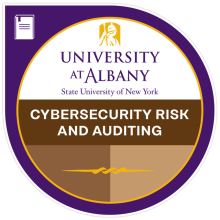Cybersecurity Risk and Auditing
Credit(s)
Academic Level
Cost

There is a growing need for cyber security risk assessment throughout public and private sector organizations. The Cybersecurity Risk and Auditing Microcredential builds and validates focused skills on cybersecurity risk and auditing. It is especially suited for transitioning employees who are looking to work in cybersecurity.
You will complete three graduate courses (BCYB 644, BCYB 640 and BCYB 652) to earn the microcredential. At the conclusion of the microcredential, you will be ready for the Certified Information Security Auditor exam offered by ISACA.
Course 1: BCYB 644 - Introduction to Information and Cyber Security (3 credits)
In this class, vulnerabilities of computer networks and techniques for protecting networks and data are discussed. Basic elements of symmetric and asymmetric cryptography, secure e-commerce, involving secure transmission, authentication, digital signatures, digital certificates and Public Key Infrastructure (PKI) is presented. Issues in privacy and piracy are also discussed where you will study and debate controversial topics such as media piracy and government surveillance.
Course 2: BCYB 640 - Information Security Risk Assessment (3 credits)
*Pre-requisite BCYB 644
This course provides you with an introduction to the field of information security risk assessment. Initially, you will be introduced to basic definitions and nomenclature in the area of security assessment. Thereafter you will be taught different approaches for assessment of risk. The course will incorporate cases in risk analysis derived from state and law enforcement agencies. You will learn how to use a risk analysis matrix for performing both quantitative and qualitative risk analysis. As part of the course you learn about the different threats that you need to incorporate in your risk analysis matrices.
Course 3: BCYB 652 - Strategic Management in Cyber Security (3 credits)
(Pre-requisites: BCYB 644 and BCYB 640)
Information security has become a strategic business imperative given today’s globally connected world, dependencies on information and technology, and growing cyber threat landscape. This capstone course will provide you with an introduction to information security strategic planning and leadership. It explores the relationship between the business environment and organizational goals, risk management, and protecting information assets. You will learn practices that help business leaders ensure comprehensive security programs and strategic plans that resonate with executives, stakeholders, and management, as well as essential skills required to lead and motivate teams. This course will enhance your overall understanding and effectiveness in key areas of strategy, risk management, budget, communication, partnership, critical thinking and change management.
These courses can be applied to the Certificate of Graduate Study in Information Security and the Master of Science Digital Forensics and Cybersecurity.
To register for this microcredential, you must apply for non-degree graduate study and indicate that you are interested in Cybersecurity Risk and Auditing Microcredential which begins with BCYB 644 - Introduction to Information and Cyber Security (3 credits).
Earning the Badge
Once you successfully complete all required courses, please email [email protected] to request access to the completion form so you can receive your Credly badge.



